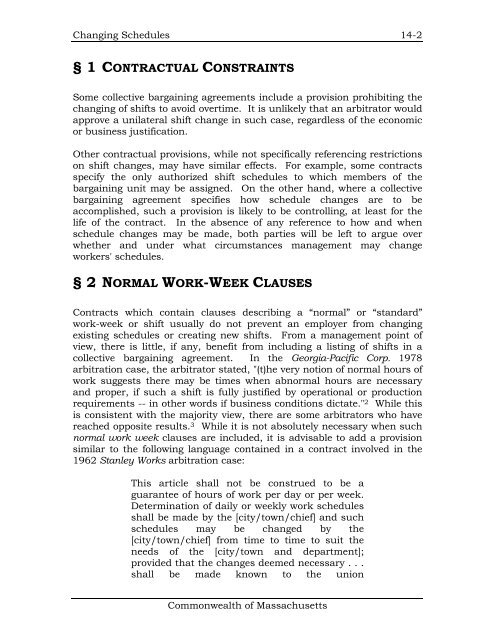Management Rights - AELE's Home Page
Management Rights - AELE's Home Page
Management Rights - AELE's Home Page
You also want an ePaper? Increase the reach of your titles
YUMPU automatically turns print PDFs into web optimized ePapers that Google loves.
Changing Schedules 14-2<br />
§ 1 CONTRACTUAL CONSTRAINTS<br />
Some collective bargaining agreements include a provision prohibiting the<br />
changing of shifts to avoid overtime. It is unlikely that an arbitrator would<br />
approve a unilateral shift change in such case, regardless of the economic<br />
or business justification.<br />
Other contractual provisions, while not specifically referencing restrictions<br />
on shift changes, may have similar effects. For example, some contracts<br />
specify the only authorized shift schedules to which members of the<br />
bargaining unit may be assigned. On the other hand, where a collective<br />
bargaining agreement specifies how schedule changes are to be<br />
accomplished, such a provision is likely to be controlling, at least for the<br />
life of the contract. In the absence of any reference to how and when<br />
schedule changes may be made, both parties will be left to argue over<br />
whether and under what circumstances management may change<br />
workers' schedules.<br />
§ 2 NORMAL WORK-WEEK CLAUSES<br />
Contracts which contain clauses describing a “normal” or “standard”<br />
work-week or shift usually do not prevent an employer from changing<br />
existing schedules or creating new shifts. From a management point of<br />
view, there is little, if any, benefit from including a listing of shifts in a<br />
collective bargaining agreement. In the Georgia-Pacific Corp. 1978<br />
arbitration case, the arbitrator stated, "(t)he very notion of normal hours of<br />
work suggests there may be times when abnormal hours are necessary<br />
and proper, if such a shift is fully justified by operational or production<br />
requirements -- in other words if business conditions dictate." 2 While this<br />
is consistent with the majority view, there are some arbitrators who have<br />
reached opposite results. 3 While it is not absolutely necessary when such<br />
normal work week clauses are included, it is advisable to add a provision<br />
similar to the following language contained in a contract involved in the<br />
1962 Stanley Works arbitration case:<br />
This article shall not be construed to be a<br />
guarantee of hours of work per day or per week.<br />
Determination of daily or weekly work schedules<br />
shall be made by the [city/town/chief] and such<br />
schedules may be changed by the<br />
[city/town/chief] from time to time to suit the<br />
needs of the [city/town and department];<br />
provided that the changes deemed necessary . . .<br />
shall be made known to the union<br />
Commonwealth of Massachusetts
















